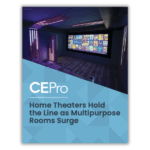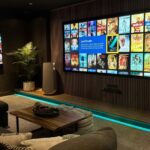Why the custom electronics industry is the Rodney Dangerfield (“No respect!”) of the design/building sector: The A/V and smart home industry has no regulation and no systems of rules, guidance, or infrastructure.
This problem goes hand-in-hand with my previous two blogs about the eventuality of IT taking over A/V and examples of how some manufacturers and dealers are still way behind the learning curve.
Other trades have all sorts of rules and standards, including requirements for certifications, inspections, and ongoing continuing education. Architects, for example, have an AIA requirement to take several CEUs worth of classes each year (we even teach one!). The accounting/finance industry has the CPA/CFA and GAAP (Generally Accepted Accounting Principles).
Doctors have to go to medical school, participate in a residency, and maintain licensure through their home state. Lawyers have to get through law school and pass the bar based on an accepted set of rules referred to as the United States Code.
Can you imagine what it would be like without these regulations? Sure you can; just look at our industry. There are no such standards demanded of technology. Ask 10 integrators to design a system and the designs will probably have more differences than similarities.
Part 1: Caution: IT Could Eat A/V for Lunch
There is no traditional schooling. There are no pricing standards or expected levels of service. Until the industry bands together, creates standards that run deep, and self implements regulations (or waits for the government to do it), we will never quite be considered a peer by fellow professionals such as doctors, lawyers, and architects, however much complexity we may master.
Meanwhile, the IT world threatens to figure it out first. What stops McGladrey, which manages a white collar consultancy and provides IT managed services to their clients alongside accounting, wealth management, and other services, from entering the consumer space? They have the expertise, cash, and connections to make a dent if they wanted. And they probably wouldn’t fail if they tried.
Part 2: Death Knell Ringing for Manufacturers, Integrators Who Still ‘Don’t Get It’
All of that said, I do remain confident that key stakeholders in our industry’s future will take us to the next level. Many fellow integrators are beginning to recognize selling hardware isn’t their true value proposition and service is becoming a core part of their offering. Some hardware manufacturers are demonstrating they’re onboard with the idea that the “experience” is what matters most. Kudos to Control4, Crestron, Ihiji, Valens, and Core Brands for making it part of their strategy based on comments like these.
Prescription for the Future
So what can we do to propel this industry forward? Here are a few ideas:
1. Develop a college degree program so that students can learn a set of skills required to do what we do; it would have classes in information technology, networking, consumer technology, emotional intelligence, customer service, and general classes related to running a business.
2. Technology companies in our space should develop advisory boards which include not only technology experts but representative dealers in our space who can speak to the consumer’s need; all too often we see technology upgrades and product developments that seem to miss on some easy and real improvements causing fragmentation in the industry between products rather than the consolidation of best technologies based on real feedback.
3. Establish an industry-recognized approach that defines excellent technology managers and integrators: everyone should have a publicly stated service level agreement (SLA), a way to report on their performance to clients, policies requiring the delivery of all documentation and programming to a client once the project has been fully paid, and many more; measure these companies and report on them, inspiring confidence in the potential customer as they embark on hiring a technology manager for the first time.
4. Create industry standards on how to evaluate technology for the consumer (we call these “Philosophies” at OneVision), how to set the technology up, and how to troubleshoot it; a wiki-like knowledge base that allows all of us to benefit from and contribute to a shared source of knowledge in an organized fashion,
5. Establish best practices in how to hire and train talent in the absence of degree programs, how to build a culture around service, and how to lead a team of professionals in an industry that has no paradigm to encourage the approach it really needs to survive.
6. Share and establish best practices in how to run a technology management (or smart home integration) company; what services to use to manage a service desk, CRM, SLA, and internal communication (try Zendesk, Pipedrive, CloudSET, and Slack).
I think there are two possible outcomes: we either (a) execute on ideas like these together as an industry, or (b) wait for an outsider to cross the threshold into the consumer technology space and bring their own established concepts with them.
I sincerely hope it’s (a) above, and once a critical mass of stakeholders recognizes that technology itself is a commodity and that brands must be built on the quality of the customer’s overall experience, we might potentially prevent having our lunch eaten by companies like Apple, Nest, and Google that, all of which live and breath this concept.
Until then, my company, OneVision Resources, will continue to hold fast to its values and defend the client experience at all costs. It’s why our clients hire us, consider us unique, and stick with us for years.













